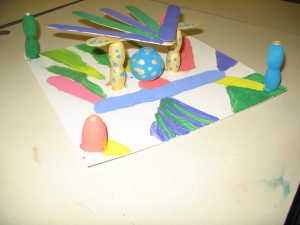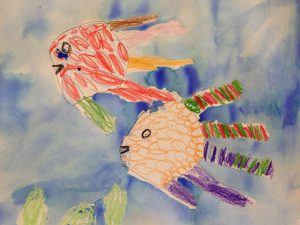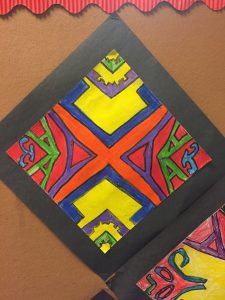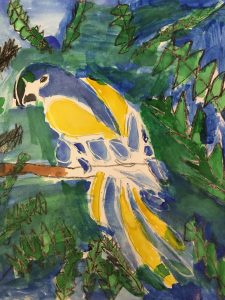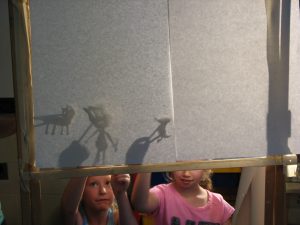Grades K – 5
This section highlights the grade levels in the Fannett-Metal Elementary School. Click on each grade level to view grade level expectations and other information.
Kindergarten
Kindergarten has GRRREAT expectations for all students at Fannett-Metal Elementary School. Students exhibit GRRREAT behaviors by: giving 100%; being responsible and respectful; making right choices; encouraging others; accepting differences and working together as a team. Students are expected to show increasing abilities to accept responsibility for their actions as the school year progresses.
Language Arts
Students are expected to recognize letters, letter sounds, and high frequency words. Students are also expected to learn beginning, middle, and ending sounds. Students will develop an awareness of rhyming, blending sounds, and segmenting words. Reading comprehension is also a focus of the kindergarten curriculum. Kindergarten uses Kid Writing as a developmental approach to written expression.
Math
We provide a basic introduction to the following math concepts: Sort and Classify, Patterns, Numbers 0 – 100, Geometry, Fractions, Number Patterns, Money, Time, Measurement , Graphing, Probability, and Addition and Subtraction. In addition, students are expected to use these math concepts to solve problems.
Science
Kindergarten science units focus on the following themes: Trees, Fabric, Wood & Paper, Life Cycles, and Oceans.
First Grade
First grade has high expectations for all of our students. We strive to encourage students to be grrreat. This includes giving 100%, being responsible, having respect, making right choices, encouraging others, accepting differences, and working as a team. Students are expected to try their best and take pride in the work they complete. Students are exposed to different types of literature and high frequency words. Students are expected to be able to identify all high frequency words with daily practice of words and reading at home. Basic math facts of both addition and subtraction up to 20 are emphasized, as well as, other skills including time, money, fractions and measurement. In addition to math and reading, students participate in kid writing daily. This increases their ability to listen for sounds in words and create stories both make-believe and real. In science, we study weather, solids and liquids, and organisms. Students are responsible for completing and returning all homework. We desire to challenge all students to become the very best person they can be, while offering them the support that they need to succeed. The outcomes are always amazing.
Second Grade
Second grade holds high expectations for all students. Students are expected to increase their personal responsibility and to take pride in the quality of their work. Two basic math concepts, addition and subtraction, are our main focus. We work on single and multiple digit addition and subtraction problems, stressing knowledge of the basic facts. We also discuss data analysis, probability, fractions, measurement, geometry, time and money. We introduce the skills of multiplication and division as well. Throughout our Language Arts block we work on various skills incorporating a variety of genres. We work on building fluency and comprehension, learning to read critically while developing their vocabulary and knowledge of high frequency words. We stress letter sounds and vowel sounds. We also work on grammar skills including the parts of speech and sentence structure. Students learn science through many hands on and interactive lessons. They learn about chemical and physical changes, the soil and its components, insects and their survival needs and balancing and weighing. During these lessons we focus on recording data, exploring, making predictions and reflecting on our results. Children learn about their role in society, various cultures and traditions, environmental issues and how to be a good citizen all during social studies. We try to build a greater appreciation for our past while preparing students for their role in the future. Children are also introduced to the writing process this year. We use graphic organizers and walk them though the process of writing narrative, persuasive, research and opinion pieces.
The more things you read, the more things you know. The more that you learn the more places you’ll go!
– Dr. Suess
Third Grade
In third grade, we inspire our students to set high expectations for themselves. Students are exposed to many kinds of literature, both fiction and nonfiction. Our students are able to read independently and orally while making meaning of what they are reading. In writing, students learn how to write expository, narrative, descriptive, and persuasive pieces using the basic components of writing (style, voice, focus, grammar, etc.). Our young learners are urged to read and write independently. In math, third graders are responsible for using and understanding basic math operations, telling time to the minute, develop an increased understanding of place value, problem solving, measurement, money, geometry, and graphing. During science, students are encouraged to work cooperatively in small groups. Learning to share and communicate information with peers is key component of the learning process. We study physical, earth, and chemical sciences. Students learn concepts as they study rocks and minerals, structures of life, ideas and inventions, and chemical tests. In Social Studies, our emphasis is on communities, map skills, and character education. Good character is taught, modeled, and students are required to be GRRREAT throughout the school day.
Show class, have pride, and display character. If you do, winning takes care of itself.
-Paul Bryant
Fourth Grade
Fourth grade teachers at Fannett-Metal have high expectations for their students. We expect our students to take on more responsibilities than they had when they were in third grade. Students are expected to copy their assignments every day from the board in their planners. They are expected to study their spelling words for weekly tests. Most weeks students have a pretest in spelling. If all students get a 100% on the pretest, students receive free time or an extra recess on Friday. Students in the fourth grade are also expected to learn states, capitals, abbreviations, and state shapes and all basic math facts in multiplication. Students should have already mastered addition and subtraction facts. Students will also get an introduction to Pennsylvania in fourth grade.
We also have high expectations for our students in language arts. Students should be reading every night. In AR, students are expected to get at least one point a week. During our classes, students will be exposed to many genres of writing. They will be taking a look at story structures, vocabulary and word study skills to help them become better readers.
We also encourage students to take risks in fourth grade, healthy risks that will benefit their own learning and expand their creative thinking skills. We encourage students to communicate with us by asking questions. If they do not understand a skill, students need to ask so that we can help them when they do not understand a concept or topic. Students will be able to use some of these skills in science where we discuss different topics including water, electricity, measurement, and the human body. Along with creative thinking skills, during science, students will be exposed to data collection, the scientific method of making predictions and testing theories.
Fifth Grade
Fifth grade is an important transitional year. In addition to teaching the regular curriculum, we want to help the students develop the skills they will need to be successful in middle school. Class meetings with the guidance councilor, school nurse, and outside speakers; and a half day to shadow a middle school student, all help our fifth graders to feel more comfortable with the move to middle school.
Our Language Arts curriculum includes Reading, Spelling, English, and Process Writing. We use many diagnostic tools to assess students’ progress regularly, and provide interventions through Guided Reading, Learning Support, computer programs, or the Title 1 Intervention program. Independent reading is promoted through our Accelerated Reader incentive program.
Multiplication by a two/three digit number, division, fractions, and decimal numbers are four skill areas that we spend a lot of time on in the fifth grade math curriculum. We continue to use the state standards to cover all the different domains of math. Students get a chance to get remediation or to work ahead using our CCC math computer program.
In our Science curriculum, we learn about Environments. We explore life science with our study of ecosystems. In physical science, we investigate levers and pulleys. We also do hands-on activities with buoyancy, space, and changes in the earth.
In Social Studies, fifth grade concentrates on the history of America. We look at different Native American tribes to see how each tribe used its environment to survive. Then, we study how early explorers and colonists changed America into the United States.
In addition to our core subjects, fifth graders have the option to join Chorus or Band. They also participate in physical education, and art and music education. Fifth grade is a very busy place!
Special Subjects
Elementary School students also have an opportunity to participate in a number of additional activities outside of the regular classroom. Time is provided in the schedule for Art, Library, Music, and Physical Education. Additionally, students needing extra support may work with Reading and Math Specialists through our Title I program.
Elementary Art
The elementary years are precious years in the world of Art. During these years children are open to experimentation and trying new things, which is a necessity in Art making and later on in life. This is the time to encourage creativity and thinking “outside the box” to help prepare our children for the future.
I strive to allow the students to experience working with as many different materials as possible, from a pencil and paper to sculptural materials. I also incorporate skills such as reading, writing and math whenever possible to give the students a well rounded experience in the arts. This also helps the students to gain a better understanding of how intertwined, and important, all of the subjects that they study are. By putting an emphasis on effort I hope to instill the importance of hard work along with creative problem solving to be carried on with the students into the future.
Library Services
The school library program serves not only to foster a love of reading but also to cultivate lifelong learning. Fannett-Metal has a library collection that offers a wide selection of books and reference materials for all grades and reading levels. Students visit the library with their homeroom one day per week. Each week during their scheduled library class, students’ learning focuses on essential library skills, including library rules, book care, allocation and use of library materials, as well as information literacy skills. After the lesson, students browse the library to select and sign out books. Lower grades are permitted to sign out two books and higher grades are permitted to sign out five books.
Music
Music surrounds us constantly in our daily life experiences. With this in mind, the elementary music program at Fannett-Metal is offered to students of all learning modalities in grades one through five. (Music is offered to PreK classes during the second half of the school year.) Our music program is designed to offer a myriad of opportunities for active participation and success. Students are regularly engaged in singing, playing instruments, moving to music, learning to read and notate music, creating music, listening to, analyzing, and evaluating music and music performances. “Share the Music” curriculum and other supplementary materials add to the aesthetic value of our program and provides a framework whereby students learn to understand and appreciate music from their own historical and cultural heritage as well as those of other cultures.
Physical Education
As a K-12 Physical Education Teacher, I cannot stress to families enough how important exercise and nutrition are in each person’s life. As a family you can do numerous activities to support good health.
Get out in the yard and pick up sticks or rake. Take a hike or ride bicycles together (Remember to wear your helmet). Pick up your ball glove, grab a soccer ball, or shoot some hoops!
These are all great family activities that involve working together and also using muscles.
Below are some links for parents to check out for activities for their children!
http://www.pecentral.org/websites/kidsites.html
https://fit.webmd.com/kids/move/article/exercise-types
Title I Reading and Math
Title I Reading and Math is a service provided for students K-8 who demonstrate a weakness in reading and/or math based on assessment information.
As Title I Reading teachers, we work with K-5 students in and out of the classroom to provide additional support and instruction during guided reading. We also pull K-5 students who need extra support during the Intervention/Enrichment block. Some of the reading programs we use to provide students the skills they need are:
- Jolly Phonics (kindergarten) focuses on letters and sounds in words
- Guided Reading leveled reading groups
- Write-In Readers (intervention for our reading series) focuses on comprehension and restating questions
- READ 1-2-3 individualized intensive reading instruction
- Six-Minute Solution focuses on fluency
- SUCCESS take home leveled readers for fluency practice
- Fluency Phrases fluency practice
- PSSA ELA Coach Books (grades 3-5) preparation for PSSA testing
- Education.com (grades 1-2) an app used on tablets focusing on phonics, phonemic awareness, grammar, sight words, and comprehension
We also work on high frequency words using a variety of resources and materials.
For more detailed information on some these programs, go to …
https://fmtigers.org/staff/holly-rotz/
https://fmtigers.org/staff/nicole-reasner/
The Title I Math teacher works with third thru fifth grade students during the morning in their regular classroom providing support or small group instruction during math class. K-2 students are also pulled out of classes for extra support during the Intervention/Enrichment block. During this time various strategies are used to reinforce basic math concepts where a weakness has been identified. Concepts being taught in the regular classroom are also covered using various hands-on manipulatives to help the student grasp the math concept. In working with the students, a variety of approaches are used to teach a skill since students learn in various ways. Strategies are developed to help the student learn the concept that is a weakness for him or her. During the Intervention/Enrichment time in the afternoon, the students in grades three thru five are doing the PSSA Math and Reading Coach Books in small groups to help them prepare for the state assessments.
Students also use different computerized math programs. Reflex Math is a computer program that can be used at home as well as here at school. This program focuses on basic fact automaticity. The facts are presented as fact families with addition and subtraction being presented together and then multiplication and division. All students in grades K through 5 are able to do the Reflex Math program. Students in grades Kindergarten thru second use the Successmaker program “Concepts and Skills” for math two times a week in the computer lab. Students’ progress at their own level in this program. It provides the students with practice on a variety of math concepts and records their progress each time they do the program. A parent report is sent home at the end of each marking period with the students’ report cards so the parents can see what level their child is at and the progress that has been made from the time the child first entered this program in Kindergarten. Classroom teachers receive a report after each computer session to monitor the students’ progress on a weekly basis. Students in grades third thru fifth use the programs “Sumdog” and “Study Island” during their computer lab times each week. Students’ progress at their level in these programs and the teachers are able to see the data for each student’s progress. The classroom teachers are able to set specific skills to be practiced by the students in “Study Island”.


